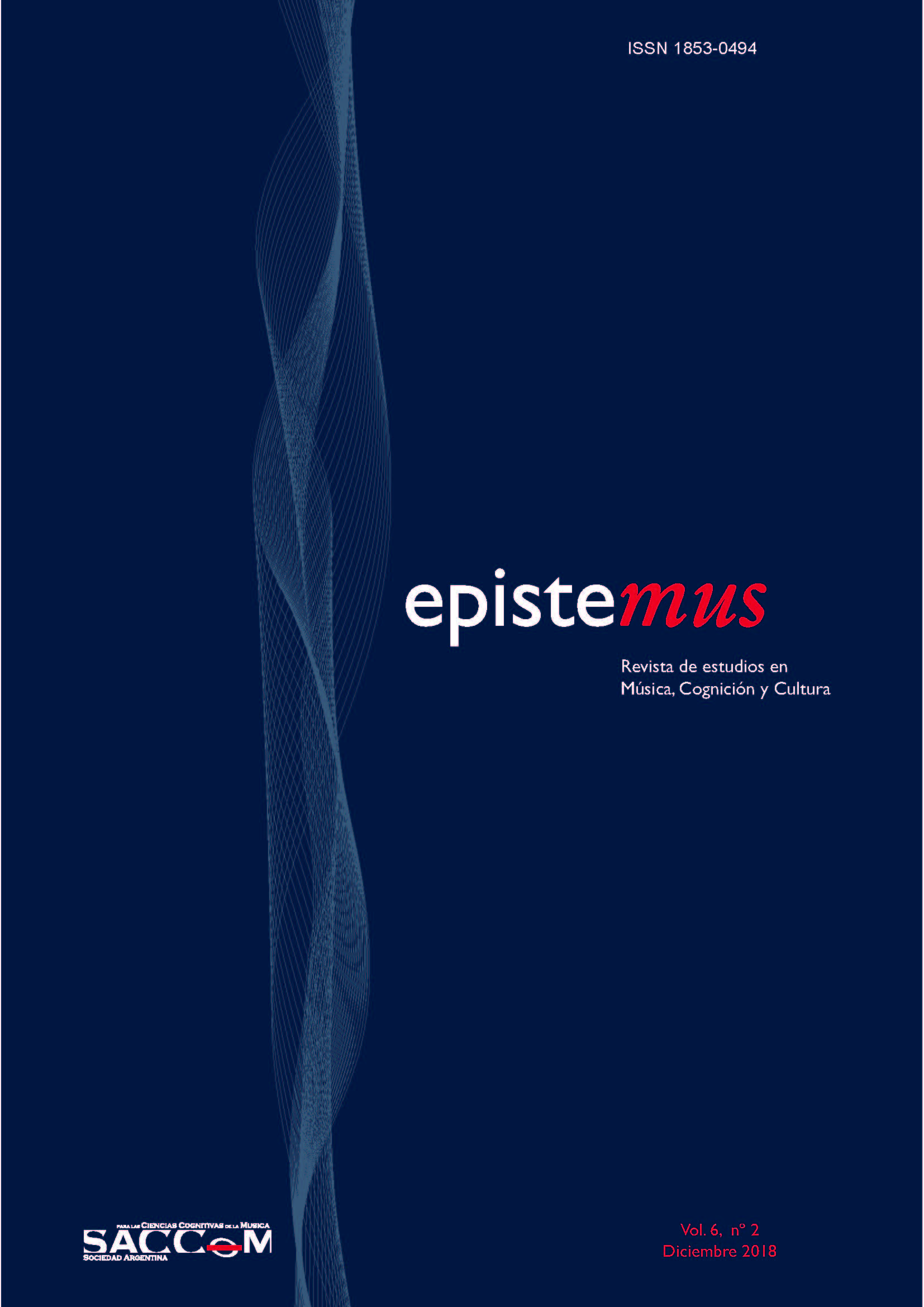The purity of talent
Musical, commercial and politics characterization fo The Voice franchise in Latin America
DOI:
https://doi.org/10.24215/18530494e019Keywords:
talent show, homogeneity, music, intelectual propertyAbstract
This paper proposes to seek the musical, economic and political characteristics of the talent show The Voice in Latin America between 2011 and 2019 in order to evaluate the vocal homogeneity degree that the format promotes internationally. It also considers the musical fieldʼ operative concepts reformulation occurred in live televised music shows and the transnational promotion of vocal techniques from American pop in different genres. We study the economic and political dimensions of the sound homogeneity expansion in the talent show performances and its impact on the reproduction of international models on a local scale, from the commercialisation of the international format television linked to the multinational record company and the mass media. This operation is analysed in the context of the international relations over intellectual property and the Anglo-American core in Latin America. The methodology combines the analytical review of the talent show editions, also the focal interview is used to consider oral history method and to the discursive analyses. The discussion considers the cultural dependencies that over ten years of the franchise has in the region by the performatic musical evaluations that participants have. The sound modernisation that the talent show offers is weighed against the commodification forms of the multinational recording industry.
Downloads
Metrics
References
Bakker, G. (2006). The making of a music multinational: PolyGram's International Businesses, 1945-1998. Business History Review 80, 81-123. DOI: 10.1017/S0007680500080995
Bakker, G. (2012). Adopting the rights-based model: Music multinationals and local music industries since 1945. Popular Music History, 6 (3), 307-343. DOI: 10.1558/pomh.v6i3.307.
Barra, L., y Scaglioni, M. (2014). Tv Goes Social Italian Broadcasting Strategies and the Chal-lenges of Convergence. View. Journal of European Television History and Culture 8, 110-124. DOI: 10.18146/2213-0969.2014.jethc074
Blanco Maldonado, A. (2017). La evolución histórica de los programas musicales en la televi-sión española: De los programas de divulgación musical a los talent shows. Ámbitos 35, 1-14. Recuperado de http://hdl.handle.net/11441/66410
Bourdon J. (1997). Le direct : une politique de la voix ou la télévision comme promesse inac-complie. Réseaux 15(81), 61-78. Recuperado de https://www.cairn.info/revue-reseaux1-1997-1-page-61.htm
Bueno, G. (2000). Televisión: Apariencia y verdad. Barcelona: Gedisa.
Cicchelli, V y Octobre, S. (2019). ¿Cómo el gusto del mundo llega a los jóvenes? El cosmopo-litismo estético-cultural en Francia en Rosario Radakovich Ana Elisa Wortman (coordinadoras) Mutaciones del consumo cultural en el siglo XXI. Tecnologías, espacios y experiencias, pp. 135-162, Buenos Aires: Editorial Teseo.
Cvetkovski, T. (2015). The pop music idol and the spirit of charisma. Reality television talent show in the digital economy of hope. Londres: Palmgrave Macmillan.
Fléchet, A. (2011). Por uma história transnacional dos festivais de música popular. Música, contracultura e transferências culturais nas décadas de 1960 e 1970. Patrimônio e Memória 7(7), pp. 257-271. Recuperado de https://pem.assis.unesp.br/index.php/pem/article/view/205
Geertz, C. (1973). The interpretation of cultures: Selected essays. Nueva York: Basic Books.
González-Neira, A., y Quintas-Froufe, N. (2015). Cómo triunfa un programa en la audiencia social: el caso de La Voz. Trípodos 36, 93-107. Recuperado de http://www.tripodos.com/index.php/Facultat_Comunicacio_Blanquerna/article/view/244
Hill, A. (2005). Reality TV. Audiences and popular factual television. New York: Routledge.
Homen de Mello, Z. (2003). A era dos festivais: uma parábola. San Pablo: Editora 34.
Matallana, A. (2006). Locos por la radio:una historia social de la radiofonía en la Argentina, 1923-1947. Buenos Aires: Prometeo.
Mello, Z. (2003). A era dos festivais. Uma parábola. San Pablo: Editora.
Merino, G. (2014). Crisis del orden mundial y encrucijada nacional- Latinoamericana. Aportes para el análisis de la situación actual de crisis y oportunidad histórica. Universidad Nacional de Misiones. Posadas: Editorial Universitaria.
Negus, K. (2005). Los géneros musicales y la cultura de las multinacionales (Número 164). Barcelona: Editorial Paidós Comunicación.
Nye, J. (2004). Soft power: the means to success in world politics. Nueva York: Public Affair.
Palomino, P. (2020). The invention of Latin-American Music. A transnational history. Nueva York: Oxford University Press.
Rincón, O. (2011). Nuevas narrativas televisivas: relajar, entretener, contar, ciudadanizar, experimentar. Revista Comunicar (Revista científica de Educomunicación, XVIII(36), 43-50. DOI: 10.3916/C36-2011-02-04
Schimmer, M. (2010). The Voice Theme. En The Voice [Streaming]. Londres: Geek Music.
Shatkin, J. Y Furler, S. (2014). Chandelier. En 1000 forms of fear [CD]. Los ángeles, EUA: RCA records.
Small, Ch. (1989). Música. Sociedad. Educación. Madrid: Editorial Alianza.
Smith, J. (2008). Vocal tracks: performance and sound media . California: University of Cali-fornia Press.
Tomlinson J. (1999). Globalization and culture. Chicago: University of Chicago Press.
Varela, M. (2005). La televisión criolla. Desde sus inicios hasta la llegada del hombre a la luna 1951-1969. Buenos Aires: Edhasa.
Ynoub, R. (2014). Cuestión de método. Aportes para una metodología crítica. México D.F.: Cengage learning.
Yúdice, G. (2007). Nuevas tecnologías, música y experiencia. Barcelona: Gedisa.
Downloads
Published
How to Cite
Issue
Section
License
Politica vigente desde octubre de 2019
La aceptación del manuscrito por parte de la revista implica la cesión no exclusiva de los derechos patrimoniales de los/as autores/as en favor del editor, quien permite la reutilización, luego de su edición (postprint), bajo una Licencia Creative Commons Atribución-NoComercial-CompartirIgual 4.0 Internacional (CC BY-NC-SA 4.0)
Acorde a estos términos, el material se puede copiar y redistribuir en cualquier medio o formato siempre que a) se cite la autoría y la fuente original de su publicación (revista y URL de la obra), se brinde el acceso a la licencia y se indique si se realizaron cambios; b) no se utilice el material para fines comerciales.
La cesión de derechos no exclusivos implica que luego de su edición (postprint) en Epistemus los/as autores/as pueden publicar su trabajo en cualquier idioma, medio y formato; en tales casos, se solicita que se consigne que el material fue publicado originalmente en esta revista.
Tal cesión supone, también, la autorización de los/as autores/as para que el trabajo sea cosechado por SEDICI, el repositorio institucional de la Universidad Nacional de La Plata, y sea difundido en las bases de datos que el equipo editorial considere adecuadas para incrementar la visibilidad de la publicación y de sus autores/as.
Asimismo, la revista incentiva a los/as autores/as para que luego de su publicación en Epistemus depositen sus producciones en otros repositorios institucionales y temáticos, bajo el principio de que ofrecer a la sociedad la producción científica y académica sin restricciones contribuye a un mayor intercambio del conocimiento global.

















